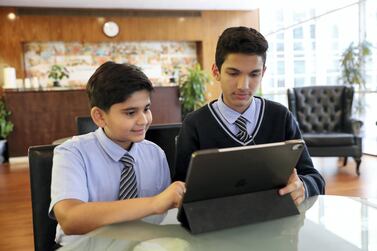The effect of examination pressure on pupil well-being was put to the UAE's education minister in a Federal National Council meeting on Wednesday.
At this term’s closing session, Ayesha bin Samnoh asked Minister Hussein Al Hammadi about issues related to the tests taken at the end of the first term of Emirati-curriculum secondary schools.
She first asked Mr Al Hammadi why make-up exams for first-term finals had been abolished and said concerned parents had raised the issue with her.
Ms bin Samnoh argued that pupils often had legitimate reasons for being unable to sit the exams or for performing poorly on the day.
She said such children should have the opportunity to improve their overall marks.
Mr Al Hammadi said exams sat by pupils at the end of the first and second terms do not determine whether they pass or fail, unlike the end-of-year final exam, which can be retaken. Should a pupil perform poorly in their first or second-year exam, their overall performance will be evaluated instead.
During this evaluation, a pupil's strengths and weaknesses are ascertained and teachers will tailor their approaches to pupils accordingly.
Mr Al Hammadi said the goal was not to put pressure on children to earn high marks but rather to develop their critical thinking skills.
“The education policy now is for the pupil to learn skills and to evaluate those skills over the year as a whole, and not to only count on exam results to evaluate their performance,” he said.
Another FNC member, Naama Al Sharhan, asked the minister why pupils were required to attend lessons for the rest of the school day after sitting an exam.
She suggested they be allowed to leave the school immediately afterwards so they could study for their next test.
“After solving an exam they cannot focus on anything. They should go home and prepare for the next day’s exam,” she said.
“Some pupils stay up until dawn studying, so once they are done they should use the time to study for the next day.”
The minister said pupils were required to stay at school to review the exams with their teachers.
"If a pupil is staying up until dawn, there is something wrong with the way they are studying, because now the method has changed. The exams don't focus on memorising the material like they used to – now it focuses on skills and practical knowledge," Mr Al Hammadi said.
At the end of the meeting, FNC member Saeed Al Remeithi raised concerns on behalf of parents who had complained it was difficult for them to drive their children to school each day and that the bus routes did not serve their districts.
The minister said he had not received any complaints, prompting Mr Al Remeithi to say that was a problem in itself.
Mr Al Hammadi said some schools planned to relocate and that the ministry is formulating a new transport plan to serve a wider network of pupils. He also asked Mr Al Remeithi to provide the names of pupils facing travel problems.
Concern over a lack of physical education classes in schools was also raised.
FNC member Mohammed Al Ameri said the failure of pupils to develop physical fitness was particularly noticeable for those conscripted into National Service in early adulthood.
Mr Al Ameri suggested greater emphasis be placed on physical health and that National Service training be introduced into the school curriculum.
“Many enter the service and they get shocked by the change from civil life to military life,” he said. “Many are physically and psychologically unfit for the service and don’t understand the point of it.”
Compulsory military service for Emirati men aged between 18 and 30 was introduced in the UAE in 2014.
Women within the same age group can volunteer, as can men aged between 30 and 40.
Last year, National Service was extended from 12 to 16 months for young men holding a secondary school certificate and above.
Recruits spend their first year undergoing physical training before being stationed for the remainder of their service.
Mr Al Ameri, who has a military background, proposed that the pupils complete their military training during summer holidays.
When they leave secondary school, they can finish their National Service, he said.
Minister Al Hammadi said such a decision did not fall within his purview.







